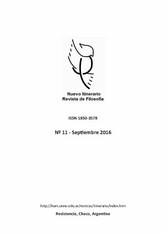Phenomenological hermeneutics as a bridge for the development of pedagogical hospitality in evanescent societies
DOI:
https://doi.org/10.30972/nvt.2017565Keywords:
Phenomenological hermeneutics, cardinal epistemologies, evanescent societies, epistemic hospitality, pedagogical hospitalityAbstract
This article presents a thematic itinerary, analyzing, in the first instance, the characteristics and nature of the graft of hermeneutics on phenomenology in the thought of the French philosopher Paul Ricoeur. It is an interweaving of subjective hermeneutics with a phenomenology of the self. Subsequently, as mentioned above, the analysis moves from the graft to constructing an interpretation of the world of life and social reality towards a plural epistemology, which requires emptying the self into another. The Other appears as strange and foreign in social interaction. Such displacement requires the orientation of a visée éthique (Ricoeur, 1990a), capable of engaging subjects with the narrative construction of their existences, creating a narrative identity and responding to the actions of the subject who constructs his or her story.
In addition, the ethical purpose must lead the subjects involved to inhabit an ethical pluralism, which, through dialogicity, can make social subjects appear as agents endowed with rights, concerns (concerns) and duties in social interaction.
Subsequently, we present a comprehensive overview of the evolution of epistemologies. These are broadly categorized into terrestrial societies and cardinal epistemologies, liquid societies or epistemologies of deconstruction, and evanescent societies or epistemologies of loss and social innovation.
The nature of evanescent societies is characterized by loss of identity and access to universal rights, which leads to exclusion, vulnerability, and social pathologies. Equally, they lead to the emergence of new identities and innovative ways of presence in the ethical-political and socio-cultural spheres.
Before the conclusions that close this work, we affirmed the need for epistemic hospitality and an ethics of hospitality, allowing hospital pedagogies to emerge. We favor both the exercise of the hermeneutics of the self and the phenomenology of the self, as well as the aspiration of subjects to a dignified life, counting on mutual social recognition and developing existence in just and democratic institutions.
References
Avenatti, C. y Bertolini, A. (2016). La nupcialidad entre la estética teológica y la ontología trinitaria [en línea]. Teología, 119, 81-113.
Agamben, G. (1998). Homo Sacer I. El poder soberano y la nuda vida. Valencia: Pretextos.
Arendt, H. (2007). ¿Qué es la política? Ciudad de México: Paidós.
Arendt, H. (1968). The Origins of Totalitarianism. New York: Harcourt.
Arendt, H. [1958] (1993). La condición humana. Ciudad de México: Paidós.
Basil, P. (2019). Elogio de la hospitalidad. Sobre la comida y el sentido de la generosidad. Madrid: Alfabeto.
Bauman, Z. (2005). Amor líquido. Acerca de la fragilidad de los vínculos humanos. Ciudad de México: Fondo de Cultura Económica.
Bauman, Z. (2000). Modernidad líquida. Ciudad de México: Fondo de Cultura Económico.
Benhabib, S. (2006). Another Cosmopolitanism. Oxford: University of Oxford.
Blanco, J. (2005). La fenomenología hermenéutica de la persona según Paul Ricoeur. Revista de filosofía y teoría política. 36(1), 29-52.
Boorstin, D. (1997). Los descubridores. Volumen I: El tiempo y la geografía. Barcelona: Grijalbo Mondadori.
Butler, J. (2000). El marxismo y lo meramente cultural. New Left Review, 2(1), 109-121.
Butler, J. y Fraser, N. (2017). ¿Reconocimiento o redistribución? Un debate entre marxismo y Feminismo. Madrid: Traficantes de sueños.
Condon, J. & Corkindale, C. (2011). The correlates of antenatal attachment in pregnant women. British Journal of Medical Psychology, 70(7), 359-372.
Correa-Arias, C. (2024). De la formación teórica al pensamiento epistémico en los posgrados en Educación en América Latina. Revista UNIMAR, 42(1), 87-102.
Correa-Arias, C. (2021). Literacy, Orality and Didactics. Teaching and Exclusion in Times of Uncertainty. En César Correa-Arias, Responsabilidad Social, Ética e Inclusión en los Procesos de Formación, Barcelona: Octaedro. pp. 85-110.
Correa-Arias, C. (2019). La necesidad de un Giro Pedagógico al interior de las teorías sobre Justicia Social. La Educación ante el cultivo de la humanidad. En José Juan Sainz Luna, Aurora Cuevas Peña, Mónica Torres Sánchez y Ramón Ascencio Franco (Coords.), Inclusión Educativa y reconocimiento social. Ciudad de México: Editorial Fontamara, pp. 61-80.
Courie, L. (1972). The Black Death and Peasant's Revolt. Wisconsin: Wayland Publishers.
Delgado, C. (2017). Hospitalidad y ciudadanía desde la perspectiva de Seyla Benhabib. En Evelia Arteaga, Mariela Oliva y Roxana Rodríguez (Comp.). Hospitalidad y ciudadanía. De Platón a Benhabib. Ciudad de México: Ítaca.
Derrida, J. (2005). The principle of Hospitality, in Paper Machine, pp. 65-83. Stanford: Stanford University.
Derrida, J. (1998). Hospitality, Justice and Responsibility: A Dialogue with Jacques Derrida, in Kearney, R. y Dooley, M. (eds.), Questioning Ethics: Contemporary Debates in Philosophy. London: Routledge, pp. 70-71.
Derrida, J. (1997). El Monolingüismo del otro. Buenos Aires: Manantial.
Fraser, N. (2008). Scales of Justice: Reimagining Political Space in a Globalizing World. New York: Columbia University Press.
Fraser, N. & Honneth, A. (2003). Redistribution or Recognition? A Political-Philosophical Exchange. Brooklyn: Verso.
Goodwyn, S., Acredolo, L., & Brown, C. (2000). Impact of symbolic gesturing on early language development. Journal of Nonverbal Behavior, 24(2), 81–103.
Guille, G. (2015). Las aporías de la hospitalidad en el pensamiento de Jacques Derrida. Eikasía: revista de filosofía, 64, 263-276.
Grondin, J. (1989). Introducción a la hermenéutica filosófica. Ciudad de México: Herder.
Habermas, J. (1999). La inclusión del otro. Estudios de Teoría Política. Ciudad de México: Paidós Básica.
Han, B-Ch. (2021). Ausencia. Acerca de la cultura y la Filosofía del Lejano Oriente. Buenos Aires: Caja Negra.
Han, B-Ch. (2012). La Sociedad del Cansancio. Barcelona: Herder.
Heller, A. (1998). Aristóteles y el mundo antiguo. Barcelona: Ediciones Península.
Honneth, A. (2005). La Societé du mépris. Ver une nouvelle Théorie critique. Paris: Éditions La Découverte.
Honneth, A. (1997). La lucha por el reconocimiento. Barcelona: Crítica.
Koessler, R. B., Kohut, T., & Campbell, L. (2019). When your boo becomes a ghost: The association between breakup strategy and breakup role in experiences of relationship dissolution. Collabra: Psychology, 5(1), Article 29.
LeFebvre, L. (2017a). Phantom lovers: Ghosting as a relationship dissolution strategy in the technological age. In N. Punyanunt-Carter & J. S. Wrench (Eds.), Swipe right for love: The impact of social media in modern romantic relationships, pp. 219–236. Tuscaloosa: Lanham, Rowman & Littlefield.
LeFebvre, L. (2017b). Swipe me off my feet: Explicating relationship initiation on Tinder. Journal of Social and Personal Relationships, 35, 1205–1229.
Lévinas, E. (1977). Totalidad e Infinito: ensayo sobre la exterioridad. Salamanca: Sígueme.
Marías, J. (2007). Tu rostro mañana 3. Veneno y sombre y adiós. Madrid: Alfaguara.
Marías, J. (2004). Tu rostro mañana 2. Baile y sueño. Madrid: Alfaguara.
Marías, J. (2002). Tu rostro mañana 1. Fiebre y lanza. Madrid: Alfaguara.
Marías, J. (1995). Vida del fantasma. Madrid: Aguilar.
Nussbaum, M. (2012). Crear capacidades. Propuesta para el desarrollo humano. Ciudad de México: Paidós. Estado y Sociedad.
Piaget, J. (1987). Lenguaje y pensamiento en el niño. Barcelona: Paidós.
Ricoeur, P. (2006a). Del texto a la acción. Ensayos de Hermenéutica II. Ciudad de México: Fondo de Cultura Económica.
Ricoeur, P. (2006b). Caminos del reconocimiento. Ciudad de México: Fondo de Cultura Económica.
Ricoeur, P. (2004). Sur la traduction. Paris: Bayard.
Ricoeur, P. (2001). La imaginación en el discurso y la acción y la ideología y la utopía: dos expresiones del imaginario social. En Del texto a la acción. Hermenéutica II. Ciudad de México: Fondo de Cultura Económica.
Ricoeur, P. (1990a) Soi-même comme un autre. Paris : Seuil.
Ricoeur, P. (1990b). Lectures 1. Autour du politique. Paris: Seuil.
Ricoeur, P. (1988). L`identité narrative, en Corina Combet-Galland, La Narration. Quand le récit devient communication. Paris: Labor et Fides.
Ricoeur, P. (1983). Temps et récit. Tome I: L'intrigue et le récit historique. Paris: Le Seuil.
Ricoeur, P. (1975a). Hermenéutica y estructuralismo. Buenos Aires: Megalópolis.
Ricoeur, P. (1975b). Fenomenología y hermenéutica. En horizontes del relato. Lecturas y conversaciones con Paul Ricoeur. Madrid: Gabriel Aranzueque Sahuquillo. Compilador. Madrid: Universidad Autónoma de Madrid.
Ricoeur, P. (1969). Le conflit des interprétations. Paris : Seuil.
Santos, B. (2003). Crítica de la razón indolente. Bilbao: Desclée de Brouwer (Eds.).
Scribano, A. (2008). Fantasmas y fantasías sociales: Notas para un homenaje a t. W. Adorno desde Argentina. Intersticios. Revista Sociológica de Pensamiento Crítico 2(2), 87-97.
Vásquez, A. (2008). Zygmunt Bauman, Modernidad Líquida y fragilidad humana. Journal of Social and Juridical Sciences, 19(3), 46-55.
Taylor, Ch. (1996). Fuentes del yo. La construcción de la identidad moderna. Barcelona: Paidós Surcos 21.
Vincent, G. (2015). Hospitalité : La naissance symbolique de l´Humain. Strasbourg : Press Universitaires de Strasbourg.
Zapata, G. (2009). Ética, fenomenología y hermenéutica en P. Ricoeur. Acta fenomenológica latinoamericana. Volumen III (Actas del IV Coloquio Latinoamericano de Fenomenología) Círculo Latinoamericano de Fenomenología. Bogotá: Pontificie Universidad Javeriana.
Published
Versions
- 2024-09-18 (2)
- 2024-06-28 (1)
How to Cite
Issue
Section
License

This work is licensed under a Creative Commons Attribution-NonCommercial 4.0 International License.
Les autores ceden a Nuevo Itinerario los derechos de publicidad de sus trabajos, toda vez que hayan sido admitidos como parte de alguno de sus números. Ello no obstante, les autores retienen los derechos de propiedad intelectual y responsabilidad ética así como la posibilidad de dar difusión propia por los medios que consideren.












51.jpg)

